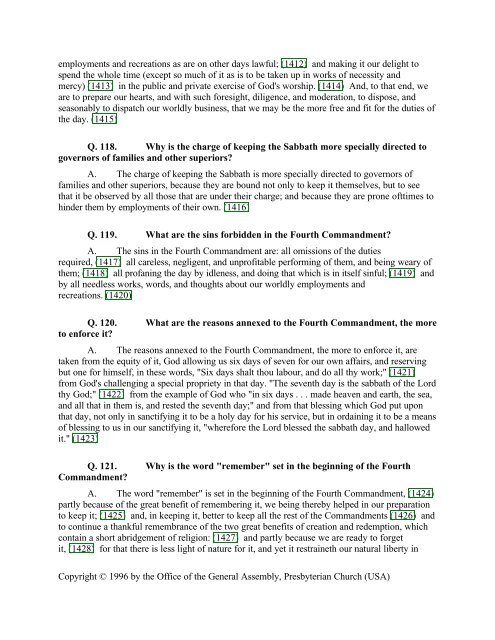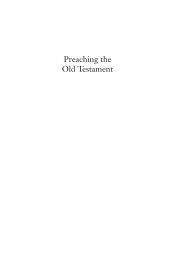The Book of Confessions - The Presbyterian Leader
The Book of Confessions - The Presbyterian Leader
The Book of Confessions - The Presbyterian Leader
Create successful ePaper yourself
Turn your PDF publications into a flip-book with our unique Google optimized e-Paper software.
employments and recreations as are on other days lawful; (1412) and making it our delight to<br />
spend the whole time (except so much <strong>of</strong> it as is to be taken up in works <strong>of</strong> necessity and<br />
mercy) (1413) in the public and private exercise <strong>of</strong> God's worship. (1414) And, to that end, we<br />
are to prepare our hearts, and with such foresight, diligence, and moderation, to dispose, and<br />
seasonably to dispatch our worldly business, that we may be the more free and fit for the duties <strong>of</strong><br />
the day. (1415)<br />
Q. 118. Why is the charge <strong>of</strong> keeping the Sabbath more specially directed to<br />
governors <strong>of</strong> families and other superiors?<br />
A. <strong>The</strong> charge <strong>of</strong> keeping the Sabbath is more specially directed to governors <strong>of</strong><br />
families and other superiors, because they are bound not only to keep it themselves, but to see<br />
that it be observed by all those that are under their charge; and because they are prone <strong>of</strong>ttimes to<br />
hinder them by employments <strong>of</strong> their own. (1416)<br />
Q. 119. What are the sins forbidden in the Fourth Commandment?<br />
A. <strong>The</strong> sins in the Fourth Commandment are: all omissions <strong>of</strong> the duties<br />
required, (1417) all careless, negligent, and unpr<strong>of</strong>itable performing <strong>of</strong> them, and being weary <strong>of</strong><br />
them; (1418) all pr<strong>of</strong>aning the day by idleness, and doing that which is in itself sinful; (1419) and<br />
by all needless works, words, and thoughts about our worldly employments and<br />
recreations. (1420)<br />
Q. 120. What are the reasons annexed to the Fourth Commandment, the more<br />
to enforce it?<br />
A. <strong>The</strong> reasons annexed to the Fourth Commandment, the more to enforce it, are<br />
taken from the equity <strong>of</strong> it, God allowing us six days <strong>of</strong> seven for our own affairs, and reserving<br />
but one for himself, in these words, "Six days shalt thou labour, and do all thy work;" (1421)<br />
from God's challenging a special propriety in that day. "<strong>The</strong> seventh day is the sabbath <strong>of</strong> the Lord<br />
thy God;" (1422) from the example <strong>of</strong> God who "in six days . . . made heaven and earth, the sea,<br />
and all that in them is, and rested the seventh day;" and from that blessing which God put upon<br />
that day, not only in sanctifying it to be a holy day for his service, but in ordaining it to be a means<br />
<strong>of</strong> blessing to us in our sanctifying it, "wherefore the Lord blessed the sabbath day, and hallowed<br />
it." (1423)<br />
Q. 121. Why is the word "remember" set in the beginning <strong>of</strong> the Fourth<br />
Commandment?<br />
A. <strong>The</strong> word "remember" is set in the beginning <strong>of</strong> the Fourth Commandment, (1424)<br />
partly because <strong>of</strong> the great benefit <strong>of</strong> remembering it, we being thereby helped in our preparation<br />
to keep it; (1425) and, in keeping it, better to keep all the rest <strong>of</strong> the Commandments (1426) and<br />
to continue a thankful remembrance <strong>of</strong> the two great benefits <strong>of</strong> creation and redemption, which<br />
contain a short abridgement <strong>of</strong> religion: (1427) and partly because we are ready to forget<br />
it, (1428) for that there is less light <strong>of</strong> nature for it, and yet it restraineth our natural liberty in<br />
Copyright © 1996 by the Office <strong>of</strong> the General Assembly, <strong>Presbyterian</strong> Church (USA)




